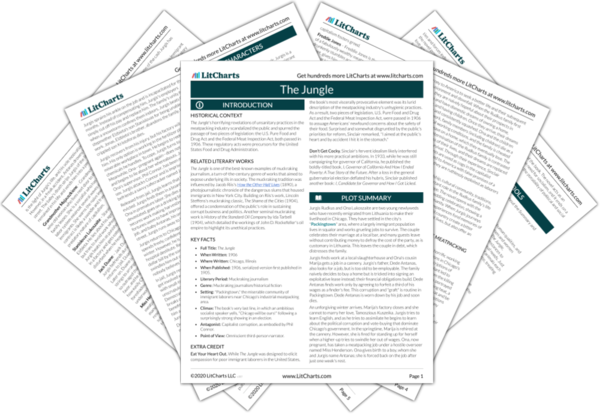Welcome to the LitCharts study guide on Upton Sinclair's The Jungle. Created by the original team behind SparkNotes, LitCharts are the world's best literature guides.
The Jungle: Introduction
The Jungle: Plot Summary
The Jungle: Detailed Summary & Analysis
The Jungle: Themes
The Jungle: Quotes
The Jungle: Characters
The Jungle: Symbols
The Jungle: Literary Devices
The Jungle: Theme Wheel

Historical Context of The Jungle
Other Books Related to The Jungle
- Full Title: The Jungle
- When Written: 1906
- Where Written: Chicago, Illinois
- When Published: 1906, serialized version first published in 1905.
- Literary Period: Muckraking journalism
- Genre: Muckraking journalism/historical fiction
- Setting: "Packingtown," the miserable community of immigrant laborers near Chicago's industrial meatpacking area.
- Climax: The book's very last line, in which an ambitious socialist speaker yells, "Chicago will be ours!" following a surprisingly strong showing in an election.
- Antagonist: Capitalist corruption, as embodied by Phil Connor.
- Point of View: Omniscient third-person narrator.
Extra Credit for The Jungle
Eat Your Heart Out. While The Jungle was designed to elicit compassion for poor immigrant laborers in the United States, the book's most viscerally provocative element was its lurid description of the meatpacking industry's unhygienic practices. As a result, two pieces of legislation, U.S. Pure Food and Drug Act and the Federal Meat Inspection Act, were passed in 1906 to assuage Americans' newfound concerns about the safety of their food. Surprised and somewhat disgruntled by the public's priorities for reform, Sinclair remarked, "I aimed at the public's heart and by accident I hit it in the stomach."
Don't Get Cocky. Sinclair's fervent idealism likely interfered with his more practical ambitions. In 1933, while he was still campaigning for governor of California, he published the boldly-titled book, I, Governor of California And How I Ended Poverty: A True Story of the Future. After a loss in the general gubernatorial election deflated his hubris, Sinclair published another book: I, Candidate for Governor and How I Got Licked.












